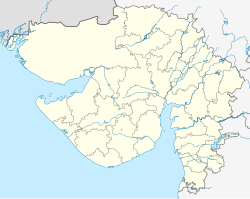Vasad
This article has multiple issues. Please help improve it or discuss these issues on the talk page. (Learn how and when to remove these messages)
|
Vasad | |
|---|---|
| Coordinates: 22°27′00″N 73°04′00″E / 22.4500°N 73.0667°E | |
| Country | |
| State | Gujarat |
| District | Anand |
| Government | |
| • Sarpanch | Dharmistha Alpeshbhai Patel (Delawala) |
| Elevation | 18.89 m (61.98 ft) |
| Population (2013) | |
• Total | 15,000 |
| Languages | |
| • Official | Gujarati, Hindi |
| Time zone | UTC+5:30 (IST) |
| Vehicle registration | GJ |
| Website | www |
Vasad is a town in Western India in the state of Gujarat. It is located on the bank of the Mahi River.
History
The ancient city of Vasudhanagari, now known as Vasad, is situated on the north bank of the holy river Mahi Sagar and serves as a gateway to the Charotar. Vasad lies in the Anand District of the Gujarat State in India. Located in the south of the district capital, Vasad is the junction between the cities,Mumbai and Ahmedabad on the Western railway. There are two railway bridges, and two road bridges that join Vasad to Charotar but only one of the bridges is situated in Vasad.[1]
Geography
This article needs additional citations for verification. (March 2021) |
Vasad is located between the two cities of Ahmedabad and Vadodara. Forests surround Vasad to the south and north-east. The central government has established the Soil Conservation and Water Research Institute in Vasad to reduce soil erosion and water management in this part of Gujarat.[2]
Economy
This article needs additional citations for verification. (March 2021) |
The two main industries in Vasad are agriculture and business. There are 45 Toor Dal (pigeon pea) processing mills located in Vasad. The two most well-known producers, Angur[3] and Laxmi Proteins,[4] produce Toor Dal in Vasad. It has also started securing fame worldwide, which has led to an increase in its export. There are five tobacco factories in Vasad. The largest of them dealing in Beedi Patti "M/s. Prakashchadra & Bros.", produce 3000 tons of processed tobacco every year. The "Bhatta" tobacco (known as "the golden leaf" in the Charotar region) of Vasad is well known for its quality.
Vasad is full of gorges. The Central Government has established a soil conservation and water research institute in Vasad to reduce soil erosion and water management. Two printing presses are located in Vasad. People from Kutch and Saurashtra run timber sawmills in Vasad. Other industries of Vasad include poultries, dairy farms, and milk production. Sand business is also being carried out on a large scale in Vasad. Cooperative institutions, among others established by farmers, sell chemical fertilizers.
The name of Vasad has been synonymous with Toor Dal and good quality tobacco. One in every three households in India uses Toor Dal from Vasad and its tobacco is popular among locals and foreigners alike. "Raymon glues and chemicals," which produces gelatin, is the biggest factory in Asia for the product. It also exports the product to various countries. Moreover, other industries also include four marble factories, cement articles factories, pole and pipe factories.
Transport
This article needs additional citations for verification. (March 2021) |
Vasad is connected by road to National Highway 64.[5] Vasad Junction railway station is the railway station connecting Vasad.[6]
Education
This article needs additional citations for verification. (March 2021) |
Sardar Vallabhbhai Patel Institute of Technology is an engineering institute in Vasad that has been in operation for over two decades.[7] Government Polytechnic is providing vocational training, and Industrial Training Institute is providing industrial training in Vasad. New English School Trust is running many primary and secondary schools in Vasad.[8] Trusts such as the Vasad Education Society run an English Medium school United School (Pre-primary, Primary & Secondary Section) & Jivan Utkarsh Mahila Mandal.
Places to see
This article needs additional citations for verification. (March 2021) |
Vasad has become a popular place of pilgrimage and attracts tourists from all over the world. There are many temples to visit such as Ambaji Mandir, Jalaram Mandir, Veharai Mata Mandir, Swaminarayan Mandir, Sat Kaival Mandir, Ram Mandir, Mahadev Mandir. It is also famous for its 200-year-old banyan tree near Mahadev temple.[8] On weekends, the Mahisagar River is flooded with devotees coming from places to feel a mesmerizing divine bath. Sindhrot Check Dam is a dam and a picnic spot on river Mahi Sagar where many come to relax and birdwatch[9]. [10][11]
References
- ^ Tajwani, KG (1979). "Soil fertility status, maintenance, and conservation for agroforestry systems on wasted lands in India". World Agroforestry (ICRAF): 171–174.
- ^ "Central Soil and Water Conservation Research and Training Institute". List of eco-friendly companies in India. Retrieved 29 March 2021.
- ^ "Angur Toor Dal". Angur Toor Dal. Retrieved 29 March 2021.
- ^ "Welcome to Laxmi Dals". Retrieved 29 March 2021.
- ^ "NH64". NH64. Retrieved 29 March 2021.
- ^ TTI. "VDA / Vasad Junction Railway Station | Train Arrival / Departure Timings at Vasad Junction". www.totaltraininfo.com. Retrieved 27 March 2021.
- ^ "Sardar Vallabhbhai Patel Institute of Technology Vasad: Courses, Fees, Admission, Eligibility Criteria, Entrance, GATE, JEE Mains, Reviews, Facilities". collegedunia.com. Retrieved 27 March 2021.
- ^ a b "Galaxy Nandanbaug Vasad in Anand District, Gujarat - Price, Reviews & Floor Plan". Housing. Retrieved 27 March 2021.
- ^ https://www.tripadvisor.com/Attraction_Review-g297613-d8817958-Reviews-Sindhrot_Check_Dam-Vadodara_Vadodara_District_Gujarat.html
- ^ Chakraborty, Diya (7 January 2019). "Go For A Trip With Your Kids To This Family-friendly Destination Of Valsad". Retrieved 27 March 2021.
{{cite web}}: CS1 maint: url-status (link) - ^ Singh, Prem. "Places to visit in Valsad District destinations & tourist spots". www.holidayyp.com. Retrieved 27 March 2021.
Tejwani, KG. (1979) Soil fertility status, maintenance, and conservation for agroforestry systems on wasted lands in India. Soils Research in Agroforestry. 171-174 Retrieved from https://agris.fao.org/agris-search/search.do?recordID=US201302654336


